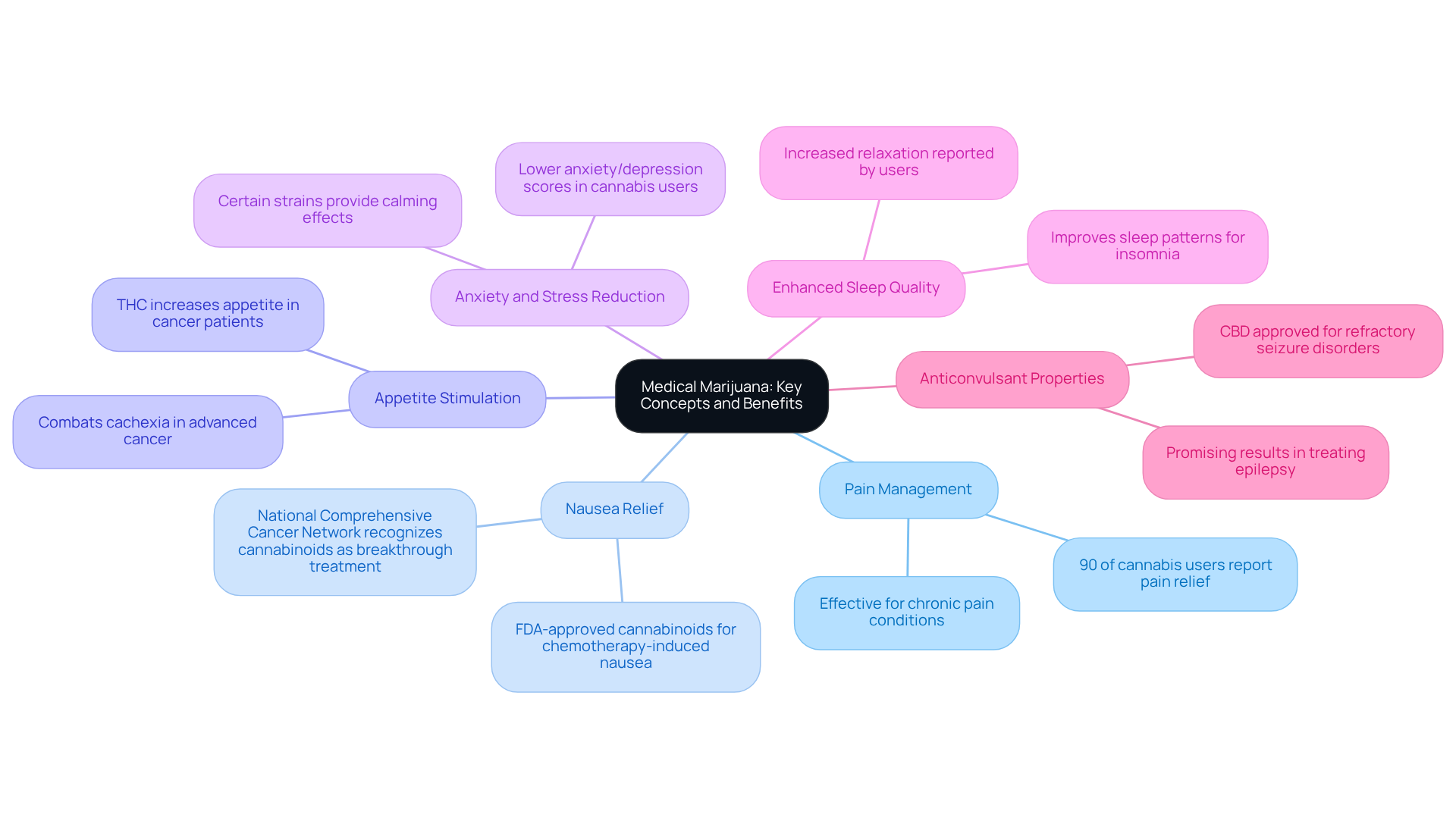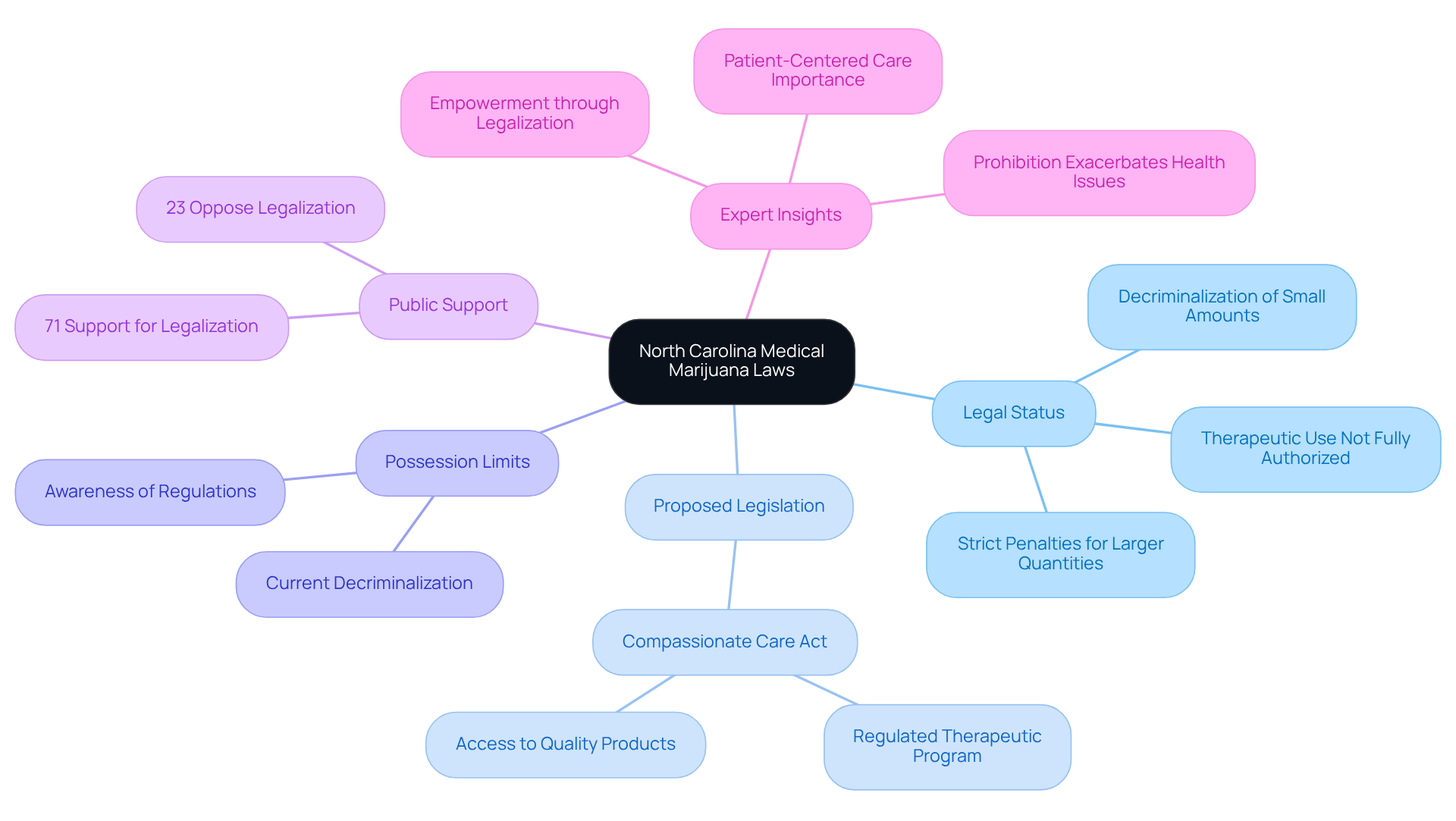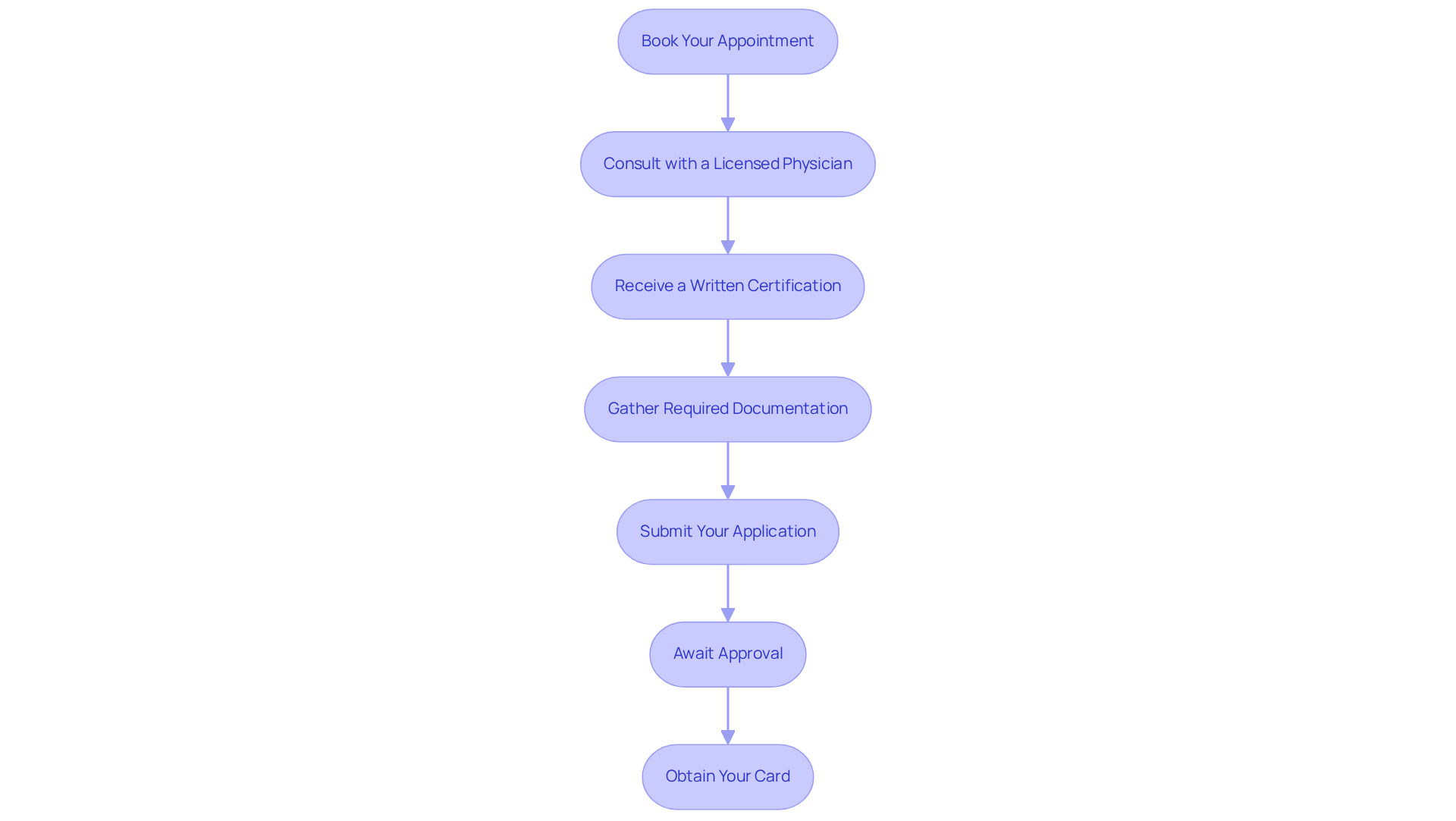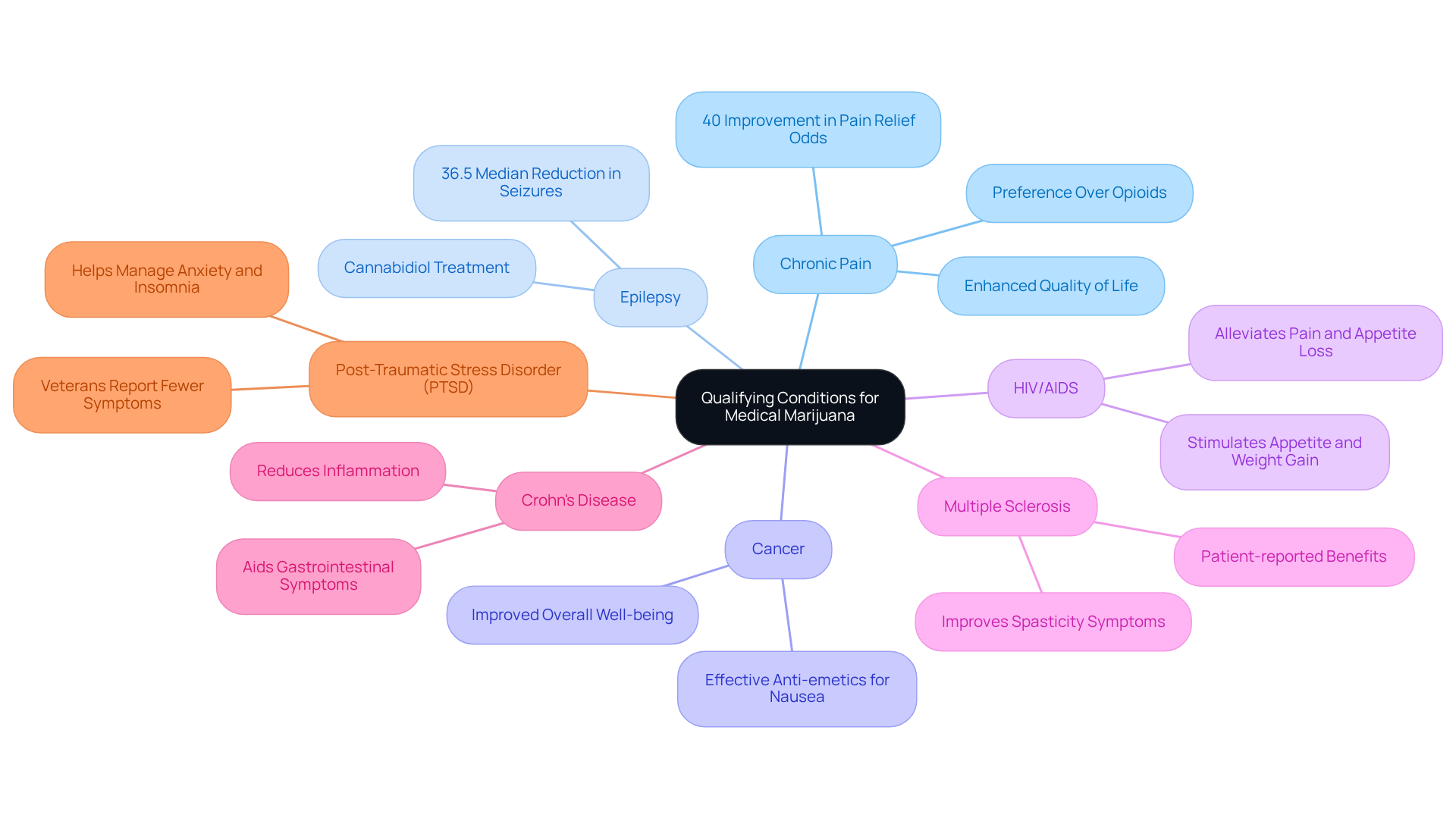Understanding Medical Marijuana in NC: A Step-by-Step Guide
by Maya Green · August 15, 2025
Explore the benefits, laws, and application process for medical marijuana in NC.

Overview
This article aims to support your understanding of medical marijuana in North Carolina, shedding light on its benefits, legal status, and the process for obtaining a medical marijuana card. It recognizes the therapeutic potential of medical marijuana for conditions like chronic pain and epilepsy, offering hope and relief to those who may be suffering. As we explore the current legislative efforts to legalize its use for patients, it’s important to remember that informed decision-making is crucial in navigating this evolving landscape.
You may find that the journey toward understanding medical marijuana can feel overwhelming, but you are not alone. Many individuals share similar concerns and questions. This article provides supportive information to help you feel empowered and informed as you consider your options. Together, we can explore the possibilities that medical marijuana may offer for enhancing your quality of life.
As you read on, I encourage you to reflect on your experiences and the potential benefits that medical marijuana could bring. Let’s take this journey together, with compassion and understanding, as we delve into the details of obtaining a medical marijuana card and what it means for your health and well-being.
Introduction
The conversation surrounding medical marijuana has gained significant momentum, particularly as states like North Carolina explore its potential therapeutic benefits. This guide aims to illuminate the multifaceted world of medical marijuana, highlighting its key benefits, the evolving legal landscape, and the steps you need to take to obtain a medical marijuana card.
It’s important to remember that as you consider this alternative treatment, questions may arise:
- What conditions truly qualify for its use?
- How can you navigate the complexities of the application process?
Understanding these elements is essential for anyone seeking to harness the power of medical cannabis for their health. You are not alone in this journey, and together we can explore the possibilities that medical marijuana offers.
Define Medical Marijuana: Key Concepts and Benefits
Therapeutic herb, often known as a medicinal plant, refers to the use of medical marijuana in nc, specifically the Cannabis sativa species or its derivatives, to address specific health concerns. The primary active compounds in medical marijuana are cannabinoids, such as THC (tetrahydrocannabinol) and CBD (cannabidiol). These compounds interact with the body’s endocannabinoid system, a complex network of receptors that regulate various physiological processes, including pain, mood, and inflammation.
Key Benefits of Medical Marijuana:
-
Pain Management: Medical marijuana can be a compassionate option for those suffering from chronic pain. Research has shown that cannabinoids can significantly reduce pain levels, making them a viable choice for individuals facing conditions like arthritis and neuropathy. For instance, a study involving 13,180 individuals with cancer revealed that 90% of cannabis users reported benefits, including notable pain relief.
-
Nausea Relief: If you or a loved one is experiencing nausea and vomiting due to chemotherapy, medical marijuana may offer relief. The National Comprehensive Cancer Network acknowledges cannabinoids as a breakthrough treatment for these symptoms. FDA-approved cannabinoids like dronabinol and nabilone have proven effective, enhancing the quality of life for many individuals.
-
Appetite Stimulation: THC can play a vital role in increasing appetite for those undergoing treatments that lead to weight loss, such as cancer therapies. This effect is crucial in combating cachexia, a common issue among advanced cancer patients.
-
Anxiety and Stress Reduction: Certain strains of medical marijuana can help manage anxiety and stress, providing a calming effect that contributes to overall well-being. You may find that this support allows for a more peaceful state of mind.
-
Enhanced Sleep Quality: For individuals facing insomnia or other sleep challenges, medical marijuana can assist in improving sleep patterns, leading to better overall health and a sense of restfulness.
-
Anticonvulsant Properties: Medical marijuana has shown promise in treating epilepsy and seizures, offering neuroprotective effects and enhancing mood.
While the benefits of medical marijuana are significant, it’s essential to consider potential adverse effects. Research indicates that 65% of individuals with cancer reported adverse effects from cannabis use, such as impaired memory and lung damage. Understanding these advantages and potential risks is crucial for making informed decisions about treatment options. Remember, you are not alone in navigating these choices; support is available to help guide you through this journey.
Explore North Carolina’s Medical Marijuana Laws and Regulations
As of 2025, North Carolina is actively fostering discussions around therapeutic cannabis, even as it remains banned for recreational use. The proposed Compassionate Care Act aims to create a regulated therapeutic program, allowing individuals with qualifying conditions to obtain cannabis legally.
It’s important to understand the current landscape of North Carolina’s medical marijuana laws:
- Legal Status: While cannabis for therapeutic purposes isn’t fully authorized yet, legislative efforts are underway to change this.
- Proposed Legislation: The Compassionate Care Act seeks to establish a safe framework for individuals to acquire medical marijuana in NC legally, ensuring access to quality products under professional supervision.
- Possession Limits: Current laws decriminalize possession of small amounts of cannabis; however, strict penalties persist for larger quantities. Awareness is crucial for individuals navigating these regulations.
- Public Support: Recent statistics reveal that 71% of North Carolinians support the legalization of medical marijuana in NC, indicating a significant shift in public sentiment.
- Expert Insights: Advocates emphasize that legalizing medical marijuana in NC would empower individuals to manage their symptoms effectively. They argue that prohibition often exacerbates health issues rather than alleviating them. Leafy DOC offers a streamlined process for obtaining a marijuana card, featuring a straightforward online application and quick approval, along with expert assistance throughout the application journey.
Staying informed about these developments is vital for individuals to ensure compliance with the law and advocate for their rights. With Leafy DOC’s secure telehealth services, patients can easily navigate the certification process and access the therapeutic benefits of cannabis for conditions such as chronic pain, anxiety, and epilepsy. Remember, you’re not alone in this journey; support is available to help you every step of the way.
Navigate the Process: How to Obtain a Medical Marijuana Card in NC
Navigating the process of obtaining a medical marijuana in nc card through Leafy DOC requires care and understanding. Here are the key steps to help you along the way:
-
Book Your Appointment: You deserve a seamless experience, so why not avoid the wait at the doctor’s office? Arrange your mmj certification evaluation from the comfort of your home. Simply submit an intake form with a few personal details and an ID. You can choose an on-demand telehealth appointment or schedule a time that works best for you.
-
Consult with a Licensed Physician: Connecting with the right doctor can happen in just minutes. Whether via phone call or video on your smartphone, computer, or tablet, you’ll be in good hands. The licensed physician will assess your qualifying condition and address any questions or concerns you may have, ensuring you feel supported in determining if therapeutic cannabis is right for you.
-
Receive a Written Certification: If you are considered qualified, the doctor will issue a written certification indicating that you may benefit from therapeutic cannabis. This important document about medical marijuana in nc will be sent to you via email, marking a significant step forward in your journey.
-
Gather Required Documentation: Take a moment to prepare the necessary documents. This includes proof of residency, identification, and any health records that support your condition. Having everything ready will help streamline the process.
-
Submit Your Application: Once you have your documentation in order, fill out the application form for a cannabis card. Send it along with the required documents to the relevant state agency. Remember, every step counts in this process.
-
Await Approval: After submission, the state will review your application. Approval times can vary, so it’s important to be patient and check for updates regularly. You are taking a positive step towards your health.
-
Obtain Your Card: Once you receive approval, you will get your health-related card, which allows you to legally purchase therapeutic products, such as medical marijuana in nc, from authorized dispensaries. This is an exciting moment in your journey toward wellness.
Some examples of qualifying conditions for a therapeutic marijuana card include: AIDS/HIV, anxiety, arthritis, cancer, chronic pain, epilepsy, glaucoma, migraine, multiple sclerosis, nerve pain, and PTSD. By following these steps thoughtfully, you can ensure a smooth application process and maximize the benefits of using Leafy DOC’s telehealth services. Remember, you are not alone in this journey; help is here for you.
Identify Qualifying Conditions for Medical Marijuana Use
In North Carolina, several conditions are recognized as qualifying for medical marijuana use, reflecting the growing understanding of cannabis’s therapeutic potential:
-
Chronic Pain: For those enduring ongoing discomfort that standard therapies fail to alleviate, medical marijuana may offer hope. Research suggests that cannabinoids can lead to a clinically significant reduction in chronic pain symptoms, with studies indicating a 40% improvement in pain relief odds compared to control conditions. Many individuals, especially those grappling with chronic pain, have reported an enhanced quality of life and a preference for marijuana over opioids due to its effectiveness and lower risk of dependency. One individual shared, “I had tried everything for pain relief before, and this service changed my life. The doctor understood my needs and helped me make an informed decision. Forever grateful!”
-
Epilepsy: Individuals battling intractable epilepsy may find relief through cannabis in managing their seizures. A significant study revealed that those treated with cannabidiol experienced a median reduction of 36.5% in motor seizures over a 12-week period, underscoring the potential of cannabinoids in epilepsy management.
-
Cancer: Cancer patients navigating treatment often turn to medical marijuana in NC to ease symptoms like pain and nausea. Cannabinoids have proven effective as antiemetics for chemotherapy-induced nausea and vomiting, providing significant relief for many. One cancer patient expressed, “Medical marijuana has made my treatment easier to endure, improving my overall well-being.”
-
HIV/AIDS: Medical marijuana in NC can help alleviate symptoms associated with HIV/AIDS, such as pain and appetite loss. Evidence indicates that cannabinoids may stimulate appetite and promote weight gain in patients facing these challenges.
-
Multiple Sclerosis: Those living with multiple sclerosis might discover comfort from muscle spasms and pain through therapeutic cannabis. Studies show that oral cannabinoids can improve patient-reported spasticity symptoms, offering a valuable treatment option for those affected.
-
Crohn’s Disease: People suffering from Crohn’s disease may utilize therapeutic marijuana to manage inflammation and discomfort, with some evidence suggesting cannabinoids can aid in reducing gastrointestinal symptoms.
-
Post-Traumatic Stress Disorder (PTSD): Medical cannabis can assist in managing PTSD symptoms, including anxiety and insomnia. Although research continues, some studies indicate potential benefits of cannabinoids in alleviating PTSD-related distress. Veterans who have used cannabis report fewer PTSD symptoms and a decreased reliance on prescription medications, highlighting its transformative impact. One veteran noted, “Connecting with a knowledgeable and compassionate doctor was a breath of fresh air. They took the time to explain the best options for my condition, and I felt heard and respected.”
Patients are encouraged to consult with their healthcare providers to determine if their condition qualifies for medical marijuana in NC treatment, ensuring a personalized approach to their healthcare needs. Leafy DOC’s telehealth services provide a compassionate and efficient pathway for patients to access the care they need, making the process of obtaining medical marijuana in NC certification both quick and accessible.
Conclusion
Medical marijuana stands as a significant advancement in therapeutic options for patients in North Carolina, offering hope and relief for various health conditions. By understanding its key benefits—such as pain management, nausea relief, and anxiety reduction—you can make informed decisions about incorporating this treatment into your healthcare plans.
Throughout this guide, we’ve explored North Carolina’s evolving medical marijuana laws, highlighting the importance of staying informed about legal frameworks, proposed legislation, and the process of obtaining a medical marijuana card. With growing public support for legal access, it’s essential for you to advocate for your rights and seek out the necessary resources to navigate this journey effectively.
As the landscape of medical marijuana continues to change, it’s crucial to engage with healthcare professionals and utilize available telehealth services like Leafy DOC. This will help ensure a smooth application process. By taking these proactive steps, you can unlock the therapeutic benefits of cannabis and improve your quality of life. Remember, informed choices lead to empowered health outcomes, and you are not alone on this journey.
Frequently Asked Questions
What is medical marijuana?
Medical marijuana refers to the use of the Cannabis sativa species or its derivatives to address specific health concerns, utilizing its primary active compounds, cannabinoids, such as THC (tetrahydrocannabinol) and CBD (cannabidiol).
How do cannabinoids interact with the body?
Cannabinoids interact with the body’s endocannabinoid system, which is a complex network of receptors that regulate various physiological processes, including pain, mood, and inflammation.
What are the key benefits of medical marijuana?
Key benefits include pain management, nausea relief, appetite stimulation, anxiety and stress reduction, enhanced sleep quality, and anticonvulsant properties.
How does medical marijuana help with pain management?
Medical marijuana can significantly reduce pain levels, making it a viable option for individuals suffering from chronic pain conditions like arthritis and neuropathy.
Can medical marijuana relieve nausea?
Yes, medical marijuana can offer relief from nausea and vomiting, particularly for individuals undergoing chemotherapy, as recognized by the National Comprehensive Cancer Network.
How does THC affect appetite?
THC can increase appetite, which is particularly important for individuals undergoing treatments that lead to weight loss, such as cancer therapies.
Can medical marijuana help with anxiety and stress?
Certain strains of medical marijuana can help manage anxiety and stress, providing a calming effect that contributes to overall well-being.
Is medical marijuana effective for sleep issues?
Yes, medical marijuana can assist in improving sleep patterns for individuals facing insomnia or other sleep challenges.
Does medical marijuana have anticonvulsant properties?
Yes, medical marijuana has shown promise in treating epilepsy and seizures, offering neuroprotective effects and enhancing mood.
Are there any potential adverse effects of medical marijuana?
Yes, while there are significant benefits, potential adverse effects include impaired memory and lung damage, with 65% of individuals with cancer reporting such effects from cannabis use.
Last Updated: August 14, 2025
Get Approved for Your Medical Marijuana Card in Minutes!

Get Your Medical Card
Connect with a licensed physician online in minutes

Like This Article?
Share with your friends
Table of Contents
Keep Reading
-
Medical Marijuana Doctor Vs. Dispensary: What’s The Difference?
Unsure whether to visit a medical marijuana doctor or a dispensary? Learn the crucial distinctions between the two and make an informed decision that suits your needs. Find out which option is best for you today!
-
What Is VidaCann Used For?
Discover the endless possibilities of VidaCann! Learn how this groundbreaking product can transform your life. Click now to unlock its secrets!
-
Navigate the Medical Marijuana Tennessee Application Process
Discover how to navigate the medical marijuana application process in Tennessee effectively.







